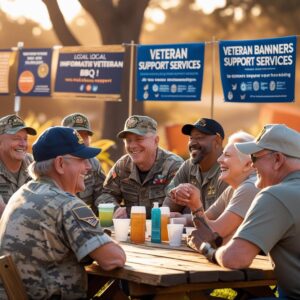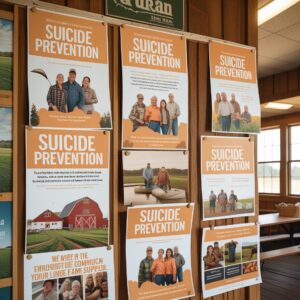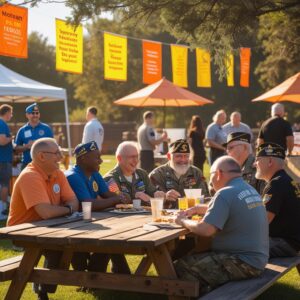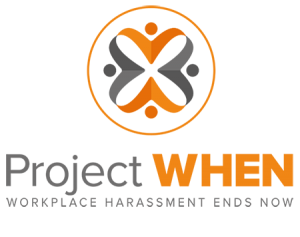How Strategic Communication Strengthens the Together With Veterans (TWV) Program in Salem County, New Jersey
 Effective communication lies at the heart of successful suicide prevention—particularly in rural communities where stigma, isolation, and limited access to services can compound mental health challenges. In Salem County, New Jersey, the Together With Veterans (TWV) program demonstrates how strategic, locally driven communication can save lives by reaching veterans where they are, fostering trust, and building a community of support.
Effective communication lies at the heart of successful suicide prevention—particularly in rural communities where stigma, isolation, and limited access to services can compound mental health challenges. In Salem County, New Jersey, the Together With Veterans (TWV) program demonstrates how strategic, locally driven communication can save lives by reaching veterans where they are, fostering trust, and building a community of support.
Through county agency leadership, national partnerships, and culturally sensitive outreach, TWV addresses the unique needs of rural veterans and empowers communities to take action. This case study explores how Salem County’s TWV program leverages communication as a tool for prevention, connection, and long-term mental wellness.
The Initiative: Together With Veterans in Salem County
Program Structure and Local Leadership
TWV in Salem County is a comprehensive, community-based suicide prevention initiative that adapts national best practices for local implementation. At its core, the program is driven by collaboration among government agencies and veteran-focused service organizations.
Key Local Government Agencies Involved:
- Salem County Division of Mental Health & Addiction Services
Coordinates mental health programs and leads community-based training like Question, Persuade, Refer (QPR)—empowering residents to recognize and respond to suicide warning signs. - Salem County Veterans Services Office
Offers wraparound support, including counseling, benefits navigation, and community outreach. Acts as the central communication hub for veteran engagement. - Salem County Department of Health & Human Services
Provides oversight and integration with county-wide public health initiatives, ensuring access to resources across social and health service networks.
Communication-Centered Program Activities
1. Culturally Informed Messaging and Community Education
TWV’s public education efforts are rooted in culturally competent communication that resonates with veterans and rural residents. Recognizing the role that community norms, local language, and lived experience play in shaping mental health perceptions, the program reframes suicide prevention as a shared community responsibility rather than a personal failing. This shift in framing helps reduce stigma, encourages proactive conversations, and makes help-seeking behavior more socially acceptable.
QPR Training Campaigns
At the core of Salem County’s outreach is the Question, Persuade, Refer (QPR) training—an evidence-based suicide prevention strategy aimed at equipping everyday people with the tools to recognize warning signs and intervene appropriately. Communication materials for these trainings are designed with simplicity and emotional accessibility in mind:
- Clear and concise language breaks down clinical terms into actionable steps.
- Facilitators use real-world examples, local stories, and familiar metaphors to make content relatable.
- Trainings are offered at accessible locations and promoted via personalized outreach from local agencies.
Importantly, QPR isn’t marketed as a “mental health workshop” but rather as a community skill-building tool—something everyone can use to support neighbors, friends, and family. This subtle messaging tweak makes a significant difference in uptake, particularly among rural residents who may be hesitant to engage in traditional mental health conversations.
Local Messaging Channels
TWV’s communication approach is hyper-local. Rather than relying on distant or generic outreach, the program distributes its messages where veterans already are:
- Flyers and posters are placed in township offices, churches, gas stations, diners, and feed stores—locations that serve as daily touchpoints in rural life.
- Announcements and call-outs are made through American Legion meetings, school board gatherings, and community events.
- Social media posts, managed by the county and supported by national TWV resources, share messages in a tone that’s conversational, encouraging, and veteran-centric.
The program also works with local champions—pastors, veteran leaders, and business owners—who incorporate suicide prevention messages into sermons, speeches, and bulletin boards. By doing so, the community hears a consistent chorus of supportive messaging from trusted, familiar sources.
Why It Works
- Culturally aligned messages normalize help-seeking behavior. By using veteran-friendly language and framing mental health care as strength—not weakness—TWV reduces shame and builds openness.
- Local venues and trusted messengers increase message credibility. Veterans are more likely to listen to a VFW post commander or a church elder than to an outsider or bureaucratic announcement.
- Simple, repeatable language like “Ask. Listen. Refer.” is not only memorable but actionable—providing a script for people who want to help but don’t know how.
2. Personalized Support Through Resource Navigation
TWV doesn’t just raise awareness—it ensures that veterans are connected to meaningful care through tailored, person-centered communication. At the heart of this approach is the Salem County Veterans Services Office, which acts as a communication hub and trusted liaison for veterans seeking support.
Veterans Services Office as a Communication Hub
Veterans who reach out to or are referred to the Salem County Veterans Services Office encounter a team trained not only in benefits administration but also in active listening and motivational support. Staff initiate engagement with empathy—often through informal phone calls, in-person meetings, or community events—creating a low-pressure environment for veterans to open up about their needs.
Once initial contact is made, staff members:
- Provide a thorough benefits review tailored to each individual’s service history and current situation.
- Offer step-by-step guidance to navigate applications for VA healthcare, mental health treatment, housing assistance, and crisis intervention services.
- Maintain consistent follow-up through phone calls, reminder mailings, and check-ins, ensuring no veteran feels forgotten after the first point of contact.
What sets this apart is the office’s emphasis on relational continuity—many veterans work with the same case manager throughout their journey, allowing trust to deepen over time.
Community Feedback Loops
Communication in the TWV program is not unidirectional. Veterans, their families, and local stakeholders actively shape the outreach strategy through regular feedback mechanisms.
- Quarterly stakeholder roundtables bring together representatives from veteran service organizations, health providers, and rural community leaders to evaluate what messaging and outreach are resonating—and what barriers still exist.
- Participant surveys capture insights on the effectiveness of QPR trainings, event engagement, and referral experiences.
- Case manager debriefs serve as a frontline lens into trends, gaps, and successful approaches emerging from day-to-day client interactions.
This feedback is not only collected—it’s acted upon. For instance, survey data showing low participation among post-9/11 veterans led to targeted outreach on social media and partnerships with younger veteran organizations.
Why It Works
- Veterans are more likely to engage when they feel seen and heard. Tailored communication honors individual circumstances, builds rapport, and counteracts institutional distrust.
- Follow-through is emphasized, not just referrals. Veterans receive help navigating complex systems, not just links to services.
- Program improvement is built on listening. By integrating community voice into communication strategy, TWV remains relevant, adaptive, and responsive.
3. Events and Engagement: Mobilizing the Rural Veteran Network
Salem County’s TWV program recognizes that communication isn’t confined to brochures and websites. It comes alive through events that connect people, reduce stigma, and cultivate a shared sense of mission. Events serve as crucial touchpoints for introducing services, building relationships, and strengthening the rural veteran network.
Community Forums and Listening Sessions
Hosted at accessible venues like American Legion posts, town halls, and library community rooms, TWV’s forums and listening sessions offer a safe, informal environment for veterans to share experiences and hear from others.
Each session includes:
- Peer storytelling—veterans who’ve engaged with mental health services or TWV resources share their journeys to inspire others.
- Panel discussions with local providers who break down available services and answer questions in plain language.
- Open mic opportunities where attendees can voice concerns, ask questions, or just feel heard.
By using a town hall format rather than a top-down lecture, these sessions build two-way trust. Veterans aren’t told what to do—they’re invited into a conversation about what their community needs.
Veteran Appreciation Events
Events like the Veteran Wellness BBQ, Holiday Thank You Drive, or Women Veterans Recognition Day serve as social gathering points that double as service access opportunities.
- TWV partners with county agencies, faith groups, and service organizations to staff outreach tables at each event, offering mental health screenings, benefits consultations, and peer support introductions.
- Giveaways and food incentives—funded through local grants and sponsorships—boost attendance and create a welcoming, celebratory atmosphere.
- These events are intentionally non-clinical: no white coats, no intake forms at the door—just connection and community.
Why It Works
- In-person dialogue deepens emotional resonance and trust. Body language, eye contact, and tone all contribute to more effective communication than digital or print outreach alone.
- Events build a sense of belonging, counteracting isolation. For many rural veterans, just being among peers can have a therapeutic effect.
- Veterans are introduced to help through community, not crisis. This proactive, dignity-driven approach makes it easier for veterans to say yes to support.
Outcomes and Communication Impact
While still an evolving initiative, Salem County’s TWV program has already demonstrated communication-driven successes:
1. Increased Awareness and Participation
- QPR trainings have reached hundreds of community members in the past year, many of whom are now confident identifying warning signs and referring peers.
- Local traffic to the veterans.salemcountynj.gov website increased following coordinated Facebook campaigns.
2. Improved Access to Mental Health Services
- Veterans are more frequently referred to mental health providers through county-led events.
- Warm hand-offs from peer advocates to county case managers have led to higher follow-through rates.
3. Strengthened Community Ties
- Agencies report improved coordination, with fewer duplicated efforts and faster service referrals.
- Veterans report feeling “more supported and seen” by their communities, according to anecdotal feedback shared at forums.
 Takeaways: Lessons from Salem County’s TWV Communication Strategy
Takeaways: Lessons from Salem County’s TWV Communication Strategy
- Localization Matters
National frameworks must be adapted to reflect the values, voices, and vernacular of the local community. - Trust is Built in Person
Relationships—not just information—move people to act. Face-to-face engagement remains essential. - Consistent, Multi-Channel Messaging Works
Flyers, word-of-mouth, websites, and social media all serve different roles but reinforce the same core message. - Empowering the Community is Preventative
Suicide prevention can’t rest solely with professionals. Communication empowers peers to take action.
Conclusion: Communication as Suicide Prevention
The Together With Veterans program in Salem County, New Jersey exemplifies how community-rooted, communication-first strategies can strengthen rural mental health systems and protect those who served. Through trusted partnerships, locally tailored messaging, and meaningful engagement, the program transforms suicide prevention from a clinical challenge into a shared community mission.
As rural communities across the country seek to improve veteran outcomes, Salem County offers a model for how communication, when done right, can connect, empower, and save lives.
Ready to Elevate Your Agency’s Public Communication?
We understand the unique challenges state and local government agencies face—from complex issues to diverse community needs. Our comprehensive approach can help you transform the way you connect with constituents, improve transparency, and highlight the valuable work your agency does every day.
Interested in learning more? Reach out to us today for a consultation. We’d love to discuss how our services can support your goals and help you build lasting trust with the communities you serve.



 Takeaways: Lessons from Salem County’s TWV Communication Strategy
Takeaways: Lessons from Salem County’s TWV Communication Strategy

